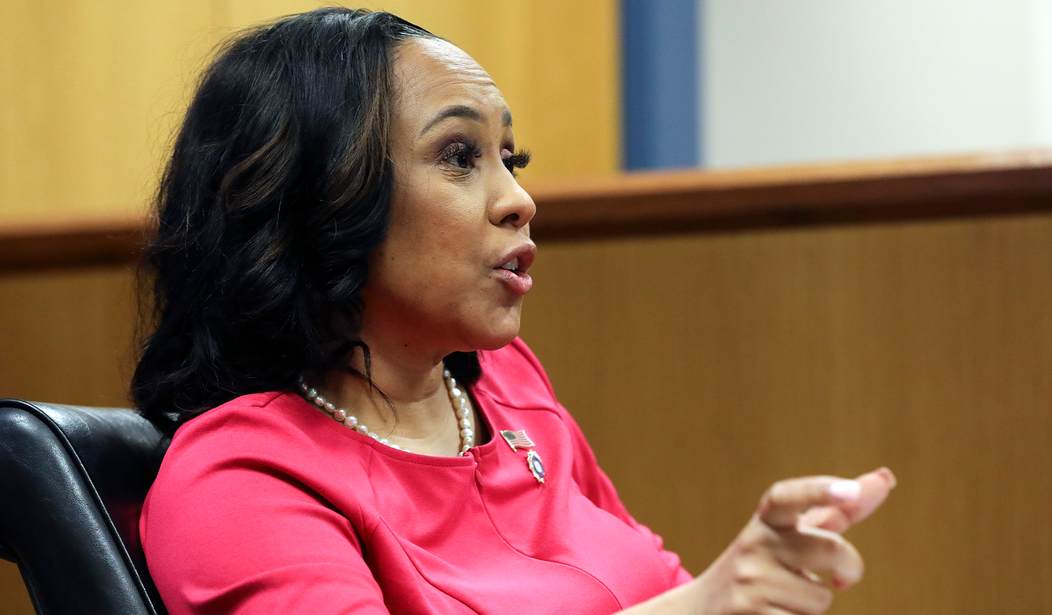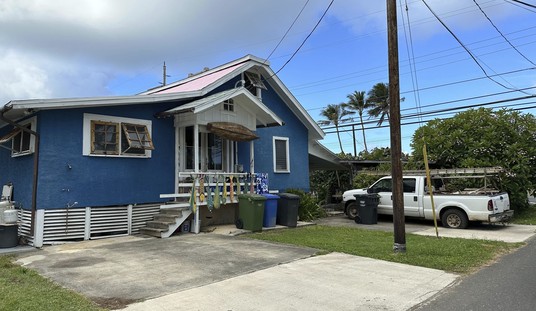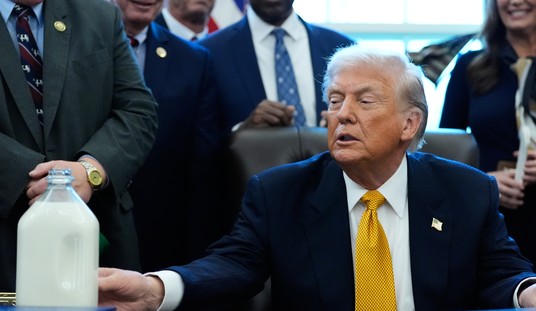Trump prosecutor Nathan Wade appears to have visited the neighborhood of Fulton County District Attorney Fani Willis far more times than they claimed under oath and well before when they alleged their affair began, according to an explosive court filing.
Friday's filing—submitted by former President Donald Trump's defense attorneys—says Wade trekked at least 35 times to a residential community in Hapeville, Georgia, where Willis was living at a friend's condominium, and traveled there twice in the middle of the night. The apparent after-hours rendezvous allegedly took place prior to when the pair says the affair started.
There were multiple "romantic" late nights at Willis's condo in 2021.
— Techno Fog (@Techno_Fog) February 23, 2024
Each is corroborated by Wade's location and texts/calls between Wade and Willis.
The records disprove Willis's testimony. They aren't just disqualifying - they are a threat to Willis's career. pic.twitter.com/2lZHzFuyyw
Trump's lawyers relied on data collected from Wade's cellphone and its "pings" off of cellular towers close to the condo.
According to an affidavit written by private investigator Charles Mittelstadt, he received AT&T records from the company's Subpoena Compliance Center documenting the call and text history as well the location data of the number belonging to Wade.
"Upon receipt [of the requested records], I began an analysis using a Leads Online analytics tool called CellHawk. CellHawk is considered by law enforcement to be the gold standard in cell phone records analytics. It is used throughout the United States and Georgia by law enforcement agencies" and "should be well known" to the DA's office..."Mittelstadt wrote. "A cornerstone of the CellHawk analytics tool is the inability to manipulate the data. Data is uploaded as received by the cell provider custodian."
Recommended
Using the CellHawk analytics program, Mittelstadt compiled his discoveries into:
Exhibit A: A report of more than 2,000 voice calls and a little under 10,000 text messages exchanged between Willis and Wade over an 11-month period in 2021, specifically from January 1, 2021, through November 30, 2021, the month of his hiring.
Exhibit B: A heat map of the Wade-Willis interactions capturing "a prevalence of calls made in the evening hours."
Heat map of Fani Willis calls and texts with Nathan Wade, in 2021. Both testified under oath there was no relationship.
— Citizen Free Press (@CitizenFreePres) February 23, 2024
2,073 voice calls.
9,792 text messages.
Heavy concentration after hours.
7 days per week. pic.twitter.com/CQdzgqdz2v
Exhibit C: A report of Wade's geolocation activity near the Hapeville condo.
Mittelstadt constructed "a geofence" that isolated two cell towers in closest proximity to the condo's address. From there, he discovered "a minimum of 35 occasions" pre-2022 when Wade's phone connected "for an extended period" to either one of those towers based on Wade's data usage, voice calls, and text messages. The data revealed Wade was "stationary and not in transit."
Specifically, on the evening of September 11, 2021, Wade made a late-night visit to the Hapeville condo's vicinity at 10:45 p.m. and departed overnight at 3:28 a.m. the following morning, Mittelstadt found. According to the cellphone data, shortly after arriving in East Cobb, where his home is situated about a half-hour drive away, Wade sent a text to Willis at 4:20 a.m.
On November 29, 2021, Wade's phone was pinging to the towers near his East Cobb residence, but he allegedly left the area upon receiving a call from Willis at 11:32 p.m. "[W]hile the call continued," Wade headed towards the condo just after midnight, arriving within the geofence at 12:43 a.m. and remaining there for several hours until 4:55 a.m. the next day, Mittelstadt observed.
As required by the court, Willis responded to the filing Friday night.
In a motion demanding that the defense's exhibits be excluded, Willis disputed Mittelstadt's findings and asserted that the Trump team's submission is "clearly inadmissible," has "little evidentiary value," was "not filed in good faith," and "should not be considered by the Court." Willis went so far as to suggest that the cell site location information (CSLI) was not "legally obtained."
“Moreover, the State questions whether Defendant Trump legally obtained cell site location information, which is generally only obtainable after a finding of probable cause and issuance of a search warrant,” the response from DA’s office says.
— Zachary Cohen (@ZcohenCNN) February 24, 2024
Quite the kicker to this filing. pic.twitter.com/YTi0HVPUTl
Regardless, the cellphone records "simply do not prove anything relevant," the DA's office asserted in the objection. "The records do nothing more than demonstrate that Special Prosecutor Wade's telephone was located somewhere within a densely populated multiple-mile radius where various residences, restaurants, bars, nightclubs, and other businesses are located," the rebuttal reads. "The records do not prove, in any way, the content of the communications between Special Prosecutor Wade and District Attorney Willis; they do not prove that Special Prosecutor Wade was ever at any particular location or address; they do not prove that Special Prosecutor Wade and District Attorney Willis were ever in the same place during any of the times listed..."
There's no denial from Fulton County that Wade wasn't at Willis's condo on those dates. No denial!
— Techno Fog (@Techno_Fog) February 24, 2024
No dispute of the volume of texts/calls.
Instead, they try to exclude the evidence. (Likely unsuccessful.)
Read the response for yourself. https://t.co/qQmxpo4iaK
One tower is roughly 2,000 feet away and the other is 3,000 feet. Though the perimeter established around the condo, which is two miles from Hartsfield-Jackson International Airport, also encompasses several businesses, Mittelstadt said his methodology "eliminate[s] the possibility" that hits could be associated with routine travel on the interstate, "nearby attractions," or the airport.
Trump's team pushed back Sunday on Willis's objection, noting that the records were obtained via a subpoena issued to AT&T.
Legal analysts chiming in on the unfolding corruption case against Willis have pointed out that a court-ordered search warrant backed by probable cause is not necessarily needed here, as the state suggests, since the defense counsel is not a state actor.
As for the state's suggestion that the cell phone data was obtained unlawfully, Trump's attorney, Steve Sadow, writes in a footnote that the claim is "patently frivolous."
— Anna Bower (@AnnaBower) February 25, 2024
"The records were obtained by valid subpoena issued to AT&T," according to the filing. pic.twitter.com/ZP0PgeWEin
Mittelstadt's findings contradict what Willis and Wade claimed under intense cross-examination.
Both of them testified at the February 15 evidentiary hearing that they never slept together at the condo in question.
On the witness stand, Wade was explicitly asked if he ever stayed the night there. "Never," Wade replied. Grilled on how frequently he had visited before his hiring, Wade told Trump's lead attorney Steve Sadow it was no more than 10 times:
SADOW: "And would you say that was frequent? When I say frequent, do you think prior to November 1st of 2021, you were at the condo more than 10 times?"
WADE: "No, sir."
SADOW: "So, if phone records were to reflect that you were making phone calls from the same location as a condo before November 1 of 2021, and it was on multiple occasions, the phone records would be wrong?"
WADE: "If the phone records reflected that? Yes, sir."
SADOW: "They'd be wrong?"WADE: "They'd be wrong."
Questioned how many times Wade paid her a visit in 2021, Willis replied: "I don't think often, but I don't want to speculate." When pressed by Sadow for a number, Willis specified, "Let's say more than 10, but I'm not sure that that's even accurate. He certainly has come and picked me up, gone and grabbed some food to eat," adding: "I don't remember him being in that condo a lot."
Willis insisted that no one, except maybe one of her daughters, ever spent the night with her at the condo.
If the defense can prove that they lied during sworn testimony, it could constitute perjury and potentially bring forth criminal charges. Keep in mind that Willis is trying to convict Trump on charges of making false statements and filing false documents.
"[T]his would make this controversy far more serious than disqualification from this case. It could raise concerns over potential criminal conduct. It could also push the court to refer both attorneys to the bar," legal scholar Jonathan Turley remarks.
The allegations could not be more serious. Wade and Willis are prosecuting defendants for filing false papers and making false statements to courts. They are now accused of the same conduct, including allegedly lying under oath. https://t.co/TptQoIoWlk
— Jonathan Turley (@JonathanTurley) February 25, 2024
Willis is accused of deriving personal benefit from appointing Wade, her lover, to serve as special prosecutor in the sprawling Georgia RICO case against Trump. The relationship's timing is a critical component of the defense's argument that the affair compromised the case's integrity, as the Trump co-defendants seek to dismiss the grand jury indictment as "fatally defective."
In court, the couple claimed the romantic relationship didn't begin until spring 2022, after his appointment on November 1, 2021.
However, ex-Willis staffer Robin Bryan-Yeartie, the DA's former friend who allowed Willis to sublet her condo, testified she had "no doubt" that the affair started earlier than they alleged. Believing the fling began as early as 2019, Yeartie recounted witnessing Willis and Wade intimately embracing each other, such as hugging," "kissing," and showing "affection."
Judge Scott McAfee, who's presiding over proceedings that could result in the DA's removal from the prosecution, will now need to decide whether to admit the affidavit and the cellphone data into evidence. Mittelstadt says he is readily available to testify.
The disqualification proceedings are expected to continue this week with the defense's "star witness" Terrence Bradley, who was Wade's divorce attorney, appearing Monday before McAfee. The judge has denied Wade's bid to block Bradley's appearance.
Closing arguments on the defense's motion to disqualify Willis have been scheduled for Friday, March 1.
























Join the conversation as a VIP Member